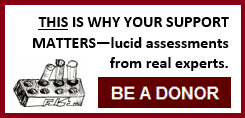Who’s in charge during the Ebola crisis?
By Laura H. Kahn | October 13, 2014

Epidemics test the leadership skills of politicians, and the Ebola crisis now spiraling out of control exemplifies this reality. The most effective political leaders have experts and infrastructures in place and prepared for such events. None of the three West African countries at the heart of the Ebola epidemic—Guinea, Liberia, or Sierra Leone—had enough doctors, nurses, or public health professionals to deal with routine diseases, let alone this new strain of Ebola. The United States has the medical infrastructure to deal with lethal pathogens. But as the recent Ebola death in Dallas, Texas, has shown, the US system is hardly infallible; one of the victim's nurses has now been diagnosed with Ebola, as has happened repeatedly with African doctors and nurses caring for Ebola patients.
So what’s gone wrong and what’s going right in dealing with the Ebola outbreak?
Disaster at the center: Guinea, Liberia, and Sierra Leone. All three of the most seriously affected West African countries have suffered from years of war, governmental corruption, and extreme poverty, making them among the least capable of countries to handle a deadly disease outbreak. Ebola had not struck in these countries previously, causing a delay in recognition. By the time it was finally identified, the virus had spread too widely to contain with the limited resources available.
Elected in 2010, Alpha Conde, the current Guinean president, is the first leader to be chosen democratically in that country. His political career began in the late 1950’s, when he helped bring about Guinea’s independence from France. Conde inherited the massive corruption scandals, centering around the giveaway of mining concessions, from his predecessors and has been struggling to address them, even as he survived an assassination attempt. Guinea has had the fewest cases (1,350 out of 8,376) and deaths (778 out of 4,024) of the three countries at the center of the outbreak.
In 2005, Ellen Johnson Sirleaf was the first woman to be elected head of state in Africa. As president of Liberia, she was credited with ushering in peace after 14 violent years of civil war. She was awarded the Nobel Peace Prize in 2011 along with two other women activists. She has been an effective president, but the Ebola outbreak has been severely testing her leadership skills. Her quarantine of one of Monrovia’s large slums backfired, as residents responded with violence to this unsuccessful effort to curb the spread of Ebola.
Ernest Bai Koroma became president of Sierra Leone in 2007, five years after the end of a decade-long civil war. He was slowly improving the country’s infrastructure when Ebola struck. In July 2014, he declared a state of emergency and launched a National Response Plan. Tragically, the country suffered a huge loss when Sheik Humarr Khan, a virologist and expert in viral hemorrhagic fevers, died from Ebola. He was only 39 years old. The country sequestered its entire population for three days so health care workers could go from house to house educating people about Ebola. The effort was declared a success even though people complained about food shortages and economic hardships and not every household was visited. In October, however, health officials admitted defeat in their attempts to move all Ebola victims into isolation facilities and began distributing supplies to families to care for loved ones at home. There simply were not enough isolation beds to deal with the size of the outbreak, they said.
Success in the near periphery: Nigeria and Senegal. Nigeria, Africa’s most populous country, has successfully contained its Ebola problem. Patrick Sawyer, a Liberian American, flew to Lagos on July 20. He was ill when he landed at the airport and was ushered to the nearest hospital. After he failed to improve with anti-malaria treatments, physicians suspected Ebola. One of the last countries in Africa to battle polio, Nigeria has a large cadre of physicians and epidemiologists who were directed three days after Sawyer arrived to establish an Ebola emergency operation center that coordinated efforts with the Nigerian health ministry, the World Health Organization (WHO), the Centers for Disease Control and Prevention (CDC), UNICEF, and other international health organizations. Nigerian President Goodluck Jonathan declared a national state of emergency in early August and approved approximately $11.7 million in emergency funds. The country trained 1,800 health workers to care for Ebola patients and provided them with protective gear and isolation wards. Health workers visited 26,000 houses, made 18,000 face-to-face visits, and held almost 900 people in quarantine in their homes. As a result of these efforts, Nigeria has suffered just 20 Ebola cases and 8 deaths from the disease.
Senegal implemented strict quarantine measures after a 21-year old Guinean man traveled by taxi to Dakar to visit family. He became ill and was promptly hospitalized and isolated. Aside from this one patient, the country has had no other cases.
The world’s response. WHO Director General Margaret Chan waited four and a half months into the epidemic before declaring a global emergency. Severe budget cuts further hobbled WHO’s Ebola response capabilities. But it’s important to note that the UN health agency provides advice and support to nations, not medical staff for patient care. Sovereign nations and non-governmental organizations such as Doctors without Borders are the international suppliers of emergency medical and nursing staff.
Although Ebola poses only a small threat to the United States, the current crisis does point up serious shortcomings in America's system for dealing with outbreaks of dangerous diseases. In America, mayors and governors are in charge during public health crises. This might explain why the question, “Who’s in charge?” is inevitably asked after failures in response to public health crises. The US Constitution—written approximately 100 years before the germ theory of disease was proven by French chemist Louis Pasteur and German physician Robert Koch—places responsibility for public health squarely on the shoulders of local and state political leaders. The fields of microbiology and epidemiology did not exist in the 18th century, and one could argue that the United States is hobbled by an outdated constitution in responding to epidemics. State and local jurisdictions vary tremendously in their public health capabilities.
In the United States, the role of the CDC is purely advisory and supportive, much like the WHO at the international level. Texas Governor Rick Perry was probably not thinking about Ebola when he refused to implement the Affordable Care Act in Texas. Indeed, all the governors who refused to accept federal funding to expand Medicaid inadvertently placed their constituencies at increased risk from deadly epidemics, because the uninsured delay seeking health care and have less access when they do seek it.
At this point, it is not clear why Thomas Eric Duncan, the poor Liberian who became ill from Ebola in Dallas, was initially sent home with a bottle of antibiotics when he showed up at Texas Health Presbyterian Hospital with a fever of 103 degrees and severe abdominal pain. But it is clear that a public health-first mindset was not at work.
The United States has the medical infrastructure to deal with infectious disease outbreaks, and its capacity to respond at the international level is unsurpassed, but its response in Africa still might not be enough to help the three stricken countries at the center of the outbreak. President Obama is sending thousands of troops—including medical personnel, engineers, and transportation experts—to build isolation facilities and train local health care workers. But they will not be providing care themselves. It remains to be seen if this will be enough to contain disease spread.
The US management structure for dealing with domestic outbreaks, meanwhile, is insufficiently developed. If the first question asked in most American emergency rooms concerns insurance status, the uninsured and illegal aliens will likely continue to delay seeking treatment. The Emergency Medical Treatment and Labor Act (EMTALA) of 1986 was enacted to prevent hospitals from refusing care to anyone needing urgent care and presenting at a hospital’s emergency room, regardless of insurance status. Unfortunately, EMTALA has sometimes been viewed as a mandate not funded by the federal government, and violations occur without reprisals or corrective actions.
Policy makers should understand that having a large fraction of the US population uninsured poses a national security threat during deadly epidemics such as Ebola. If changing to a single-payer national system is, for political reasons, out of the question, then, at the very least, the Affordable Care Act must be fully implemented in all states. In addition, as it now stands, the CDC must wait until a state invites it to conduct epidemiologic investigations, and national disease surveillance depends on states voluntarily submitting data. This is a ridiculous and dangerous state of medical affairs. The CDC should have regional CDC offices around the country working year round with state and local officials to monitor and respond quickly to disease outbreaks—rather than waiting, as is now the case, until outbreaks are already well underway. Because they can provide advance warning of transmission to humans, animal disease outbreaks should get serious attention as well.
Fast-moving outbreaks require rapid identification and response. Until the United States provides rapid health care access to all of its citizens, including foreign visitors, and implements a federal disease surveillance system, it will not be as well prepared as it could be for the next naturally occurring or man-made disease crisis.
Editor's note: Laura Kahn is the author of Who's in Charge? Leadership during epidemics, bioterror attacks, and other public health crises.
Together, we make the world safer.
The Bulletin elevates expert voices above the noise. But as an independent nonprofit organization, our operations depend on the support of readers like you. Help us continue to deliver quality journalism that holds leaders accountable. Your support of our work at any level is important. In return, we promise our coverage will be understandable, influential, vigilant, solution-oriented, and fair-minded. Together we can make a difference.
Topics: Biosecurity, Columnists, Special Topics














